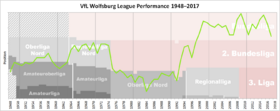VfL Wolfsburg facts for kids
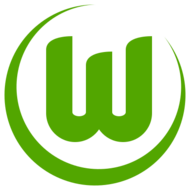 |
|||
| Full name | Verein für Leibesübungen Wolfsburg e. V. (Sports club) Verein für Leibesübungen Wolfsburg Fußball GmbH (Professional football club) |
||
|---|---|---|---|
| Nickname(s) | Die Wölfe (The Wolves) Die Weißgrünen (The White and Greens) |
||
| Founded | 12 September 1945 | ||
| Ground | Volkswagen Arena | ||
| Capacity | 30,000 | ||
| Owner | Volkswagen AG (of GmbH) | ||
| Managing directors | Peter Christiansen Michael Meeske Tim Schumacher |
||
| Head coach | Paul Simonis | ||
| League | Bundesliga | ||
| 2020–21 | Bundesliga, 4th of 18 | ||
|
|
|||
VfL Wolfsburg is a German professional sports club. It is based in Wolfsburg, Lower Saxony. The club started for Volkswagen workers in the city. It is most famous for its football team. Other sports at the club include badminton, handball, and athletics.
The men's professional football team plays in the Bundesliga. This is the top football league in Germany. Wolfsburg won the Bundesliga once, in the 2008–09 season. They also won the DFB-Pokal (German Cup) in 2015. In addition, they won the DFL-Supercup in 2015.
The professional football part of the club is called VfL Wolfsburg-Fußball GmbH. It is fully owned by the Volkswagen Group. Since 2002, Wolfsburg's home stadium has been the Volkswagen Arena.
| Top - 0-9 A B C D E F G H I J K L M N O P Q R S T U V W X Y Z |
Club History
How VfL Wolfsburg Started
The city of Wolfsburg was created on 1 July 1938. It was first named Stadt des KdF-Wagens bei Fallersleben. This name meant "City of the KdF-Car near Fallersleben". It was built for workers of the new Volkswagen factory. This factory was meant to make the KdF-Wagen, later known as the Volkswagen Beetle.
The first football team linked to the Volkswagen factory was BSG Volkswagenwerk Stadt des KdF-Wagen. This was a typical team for factory workers. They played in the top regional league, the Gauliga Osthannover. This was during the 1943–44 and 1944–45 seasons.
After World War II, a new club was formed on 12 September 1945. It was first called VSK Wolfsburg. The team chose green and white as its colors. These are still the club's colors today. A local youth coach, Bernd Elberskirch, gave them ten green jerseys. White shorts were made from bed sheets donated by local women.
On 15 December 1945, almost all players left the club. They joined a new team called 1. FC Wolfsburg. Only one player, Josef Meyer, stayed. He worked with Willi Hilbert to rebuild the team. They found new players. The reorganized club was named VfL Wolfsburg. VfL stands for "Verein für Leibesübungen," which means "Club for Physical Exercise."
Within a year, VfL Wolfsburg won the local Gifhorn championship. In November 1946, the club played a friendly match against Schalke 04. This showed that Wolfsburg was becoming the official team supported by Volkswagen.
Playing After the War
The club slowly got better in the years that followed. They won several amateur championships. However, they could not move up to a higher league until 1954. They finally reached the top league, the Oberliga Nord, after beating Heider SV 2–1. Wolfsburg found it hard in the top league. They almost got sent down each season. They were finally relegated in 1959.
When Germany's first professional football league, the Bundesliga, started in 1963, Wolfsburg was in the second division. They had just moved up from the third division. In the same year, they reached the German Amateur Championship Final, losing 0–1 to VfB Stuttgart Amat..
Second Division and Reaching the Bundesliga
Wolfsburg stayed in the second division for about twelve years. Their best result was finishing second in 1970. This allowed them to play in the promotion playoffs for the Bundesliga. However, they did not play well and could not move up.
From the mid-1970s to the early 1990s, Wolfsburg played in the third division. They finished first in 1991 and 1992. After winning the promotion playoffs, they moved up to the 2. Bundesliga for the 1992–93 season.
Wolfsburg continued to have good results in the 1990s. The team reached the final of the German Cup in 1995. They lost 0–3 to Borussia Mönchengladbach. But then, they moved up to the top league in 1997 after finishing second in their league.
After their promotion, Wolfsburg became a team that usually finished in the middle of the Bundesliga table. In the 1998–99 season, under coach Wolfgang Wolf, Wolfsburg was in fifth place near the end of the season. They hoped to reach fourth place to play in the UEFA Champions League. But they lost 6–1 to MSV Duisburg in the last game. Wolfsburg finished sixth with 55 points. This allowed them to play in the UEFA Cup the next season. They also played in the Intertoto Cup in 2000, 2001, 2003, 2004, and 2005. Their best run was in 2003 when they reached the final but lost to Italian team Perugia. After this, the club had a few less successful seasons. They barely avoided relegation, finishing 15th in both the 2005–06 and 2006–07 seasons.
2008 to Today
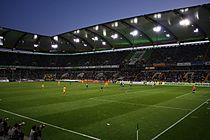
For the 2007–08 season, the club hired Felix Magath as manager. He was a former Bayern Munich manager. Under him, Wolfsburg finished fifth, which was their highest finish at that time. This also allowed them to play in the UEFA Cup for only the second time.
In the 2008–09 season, under Magath, Wolfsburg achieved their biggest success. They won their first Bundesliga title. They beat Werder Bremen 5–1 on 23 May 2009. During this season, Wolfsburg had a winning streak of ten games after the winter break. This equaled the longest winning streak in one Bundesliga season. They also became the only Bundesliga team to have two strikers score more than 20 goals each in one season. Brazilian Grafite scored 28 goals and Bosnian Edin Džeko scored 26 goals. Zvjezdan Misimović also made a record 20 assists. Because they won the title, Wolfsburg played in the UEFA Champions League for the first time.
In the 2009–10 season, Wolfsburg fired their new coach Armin Veh after the winter break. The club was in tenth place. In the Champions League, they finished third in their group. They were behind Manchester United and CSKA Moscow. This meant they did not move on in the Champions League. Instead, they qualified for the Round of 32 in the UEFA Europa League. They beat Spanish team Villarreal 6–3 over two games. Then they beat Russian champions Rubin Kazan 3–2. However, in the quarter-finals, they lost 3–1 to Fulham.
On 11 May 2010, Steve McClaren became the permanent head coach. He was a former England manager. He had just led Twente to win their first ever Dutch title. He became the first English coach to manage a Bundesliga team. However, on 7 February 2011, McClaren was fired. Pierre Littbarski took over. Wolfsburg lost four out of five matches under him. They then fell into the relegation spots.
On 18 March 2011, Wolfsburg announced that Felix Magath would return as head coach and sporting director. This was almost two years after he led them to the Bundesliga title. It was also just two days after he was fired from Schalke 04. He signed a two-year contract. Magath helped the club avoid relegation. However, even though the club spent a lot of money, Magath only achieved a mid-table finish in the 2011–12 season. After only five points in eight matches in the 2012–13 season, Magath left the club. He was temporarily replaced by former Wolfsburg reserve team coach Lorenz-Günther Köstner. On 22 December 2012, Dieter Hecking was appointed as Wolfsburg's new head coach. His contract was until 2016.
On 2 February 2015, Wolfsburg bought German international forward André Schürrle from Chelsea for €30 million. With a stronger team, the club finished second in the 2014–15 Bundesliga behind Bayern Munich. This meant they automatically qualified for the 2015–16 Champions League group stage. On 30 May, the team won the 2015 DFB-Pokal Final 3–1 against Borussia Dortmund. This was the first German Cup victory in the club's history.
On 1 August 2015, to start the 2015–16 season, Wolfsburg beat Bundesliga champions Bayern Munich in the 2015 DFL-Supercup on penalties. At the end of the 2015 summer transfer window, Wolfsburg sold Kevin De Bruyne to Manchester City. This was for a Bundesliga record fee of €75 million.
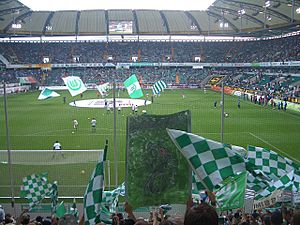
The 2015–16 season saw Wolfsburg finish in eighth place. In a Bundesliga match between Bayern and Wolfsburg, Robert Lewandowski scored five goals in just nine minutes. In the Champions League, Wolfsburg reached the quarter-finals for the first time. They played against Real Madrid. Even though they had a two-goal lead from the first match, they were eliminated after losing 3–0 at the Santiago Bernabéu Stadium in Madrid.
In January 2017, Wolfsburg agreed to partner with American team Chattanooga FC. This partnership includes women's football, youth development, and community work. The teams also talked about playing international friendly matches in the future.
Wolfsburg had a tough 2016–17 season. They changed managers several times. They finished 16th in the Bundesliga with only 37 points. This put them in a playoff against Eintracht Braunschweig. Wolfsburg won 2–0 over two games and stayed in the top league.
The 2017–18 season was also difficult. They finished 16th in the Bundesliga again. This meant another play-off, this time against Holstein Kiel. Wolfsburg won that game 4–1 over two matches.
In the 2018–19 season, Wolfsburg finished 6th in the Bundesliga. This allowed them to play in the 2019–20 UEFA Europa League.
In the draw for the Europa League third qualifying round, Wolfsburg played against Ukrainian team Desna Chernihiv. Wolfsburg won 2–0 at the AOK Stadion. They moved on to the play-off round. In the play-off round, they lost 2–1 against AEK Athens.
On 24 May 2022, Niko Kovač became Wolfsburg's new head coach. His contract was set to last until June 2025, but it ended early in March 2024. As of July 2025, Paul Simonis is the head coach.
Home Stadium
Wolfsburg plays its home games at the Volkswagen Arena. This stadium can hold 30,000 fans. Before it was finished in 2002, Wolfsburg played at the VfL-Stadium, which held 21,600 people. The Volkswagen Arena is mostly used for Wolfsburg's home games. It is where they won their first Bundesliga title in the 2008–09 season.
The amateur team and the women's football team have played at the new AOK Stadion since 2015. This stadium can hold 5,200 people. There is also a new VfL-Center with offices and training areas. The VfL-FußballWelt is an interactive exhibit about the club.
Club Achievements
National Trophies
- Bundesliga (Top German League):
- Winners: 2008–09
- Second Place: 2014–15
- DFB-Pokal (German Cup):
- Winners: 2014–15
- Second Place: 1994–95
- DFL-Supercup (German Supercup):
- Winners: 2015
Regional Trophies
- Deutsche Amateurmeisterschaft (German Amateur Championship):
- Second Place: 1963
- Amateuroberliga Niedersachsen-Ost (Second Division):
- Winners: 1952, 1954, 1963
- Regionalliga Nord (Second Division):
- Second Place: 1970
- Oberliga Nord (Third Division):
- Winners: 1991, 1992
- Second Place: 1976, 1978, 1988
- Lower Saxony Cup (Regional Cup):
- Winners: 1962, 2002, 2003
Youth Trophies
- German Under 19 championship:
- Winners: 2010–11, 2012–13
- Second Place: 2007–08
- Under 19 Bundesliga North/Northeast:
- Winners: 2007–08, 2010–11, 2011–12, 2012–13
- Under 17 Bundesliga North/Northeast:
- Winners: 2008–09, 2015–16
- Weifang Cup:
- Winners: 2015, 2017
Players
Current Team Squad
|
|
Players on Loan
|
|
Retired Jersey Numbers
- 19
 Junior Malanda, midfielder (2013–15) – This number was retired to honor him after his passing.
Junior Malanda, midfielder (2013–15) – This number was retired to honor him after his passing. - Since the 2019–20 season, players like Kevin Mbabu and Lovro Majer have worn number 19 to remember Malanda.
VfL Wolfsburg II Squad
Women's Team
The women's team has achieved great success. They won the Bundesliga, the DFB Pokal (German Women's Cup), and the UEFA Women's Champions League all in the 2012–13 season. They won the Champions League again in 2014.
Coaching Staff
European Competition Record
Club Records and Statistics
Most Appearances for the Club
This list includes games played in all competitions.
| Rank | Player | Matches |
|---|---|---|
| 1 | 420 | |
| 2 | 323 | |
| 3 | 285 | |
| 4 | 275 | |
| 5 | 271 | |
| 6 | 265 | |
| 7 | 226 | |
| 8 | 201 | |
| 9 | 194 | |
| 10 | 192 |
Top Goal Scorers
This list includes goals scored in all competitions.
| Rank | Player | Goals |
|---|---|---|
| 1 | 85 | |
| 2 | 75 | |
| 3 | 70 | |
| 4 | 67 | |
| 5 | 49 | |
| 6 | 48 | |
| 7 | 46 | |
| 8 | 38 | |
| 9 | 33 | |
Coaches of VfL Wolfsburg
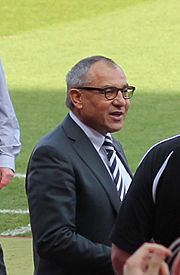
 Günter Mettke (1949–1954, player-coach)
Günter Mettke (1949–1954, player-coach) Ludwig Lachner (1954–55)
Ludwig Lachner (1954–55) Ernst Sontow (1955–56)
Ernst Sontow (1955–56) Josef Kretschmann (1956–57)
Josef Kretschmann (1956–57) Ludwig Lachner (1957)
Ludwig Lachner (1957) Walter Risse (1957–58)
Walter Risse (1957–58) Imre Farkaszinski (1958–59)
Imre Farkaszinski (1958–59) Ludwig Lachner (1963–1966)
Ludwig Lachner (1963–1966) Imre Farkaszinski (1966–1974)
Imre Farkaszinski (1966–1974) Fritz Schollmeyer (1975)
Fritz Schollmeyer (1975) Günther Brockmeyer (1975)
Günther Brockmeyer (1975) Paul Kietzmann (1975)
Paul Kietzmann (1975) Radoslav Momirski (1976–1978)
Radoslav Momirski (1976–1978) Imre Farkaszinski (1978)
Imre Farkaszinski (1978) Henk van Meteren (1978–1979)
Henk van Meteren (1978–1979) Wilfried Kemmer (1979–1983)
Wilfried Kemmer (1979–1983) Imre Farkaszinski (1983–1984)
Imre Farkaszinski (1983–1984) Wolf-Rüdiger Krause (1984–1988)
Wolf-Rüdiger Krause (1984–1988) Horst Hrubesch (1988–1989)
Horst Hrubesch (1988–1989) Ernst Menzel (1989–1991)
Ernst Menzel (1989–1991) Uwe Erkenbrecher (1991–1993)
Uwe Erkenbrecher (1991–1993) Eckhard Krautzun (1993–1995)
Eckhard Krautzun (1993–1995) Gerd Roggensack (1995)
Gerd Roggensack (1995) Willi Reimann (1995–1998)
Willi Reimann (1995–1998) Wolfgang Wolf (1998–2003)
Wolfgang Wolf (1998–2003) Jürgen Röber (2003–2004)
Jürgen Röber (2003–2004) Eric Gerets (2004–2005)
Eric Gerets (2004–2005) Holger Fach (2005)
Holger Fach (2005) Klaus Augenthaler (2005–2007)
Klaus Augenthaler (2005–2007) Felix Magath (2007–2009)
Felix Magath (2007–2009) Armin Veh (2009–2010)
Armin Veh (2009–2010) L-G. Köstner (interim) (2010)
L-G. Köstner (interim) (2010) Steve McClaren (2010–2011)
Steve McClaren (2010–2011) P. Littbarski (interim) (2011)
P. Littbarski (interim) (2011) Felix Magath (2011–2012)
Felix Magath (2011–2012) L-G. Köstner (interim) (2012)
L-G. Köstner (interim) (2012) Dieter Hecking (2013–2016)
Dieter Hecking (2013–2016) Valérien Ismaël (2016–2017)
Valérien Ismaël (2016–2017) Andries Jonker (2017)
Andries Jonker (2017) Martin Schmidt (2017–2018)
Martin Schmidt (2017–2018) Bruno Labbadia (2018–2019)
Bruno Labbadia (2018–2019) Oliver Glasner (2019–2021)
Oliver Glasner (2019–2021) Mark van Bommel (2021)
Mark van Bommel (2021) Florian Kohfeldt (2021–2022)
Florian Kohfeldt (2021–2022) Niko Kovač (2022–2024)
Niko Kovač (2022–2024) Ralph Hasenhüttl (2024–2025)
Ralph Hasenhüttl (2024–2025) Daniel Bauer (interim) (2025)
Daniel Bauer (interim) (2025) Paul Simonis (2025–present)
Paul Simonis (2025–present)
See also
 In Spanish: VfL Wolfsburgo para niños
In Spanish: VfL Wolfsburgo para niños
 | John T. Biggers |
 | Thomas Blackshear |
 | Mark Bradford |
 | Beverly Buchanan |


